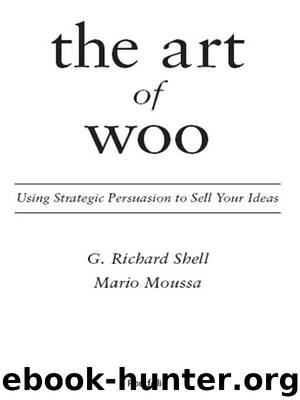The Art of Woo by G. Richard Shell

Author:G. Richard Shell
Language: eng
Format: mobi, epub
ISBN: 9781101202517
Publisher: Penguin Group USA, Inc.
Published: 2010-03-01T10:00:00+00:00
chapter seven
State Your Case: The Proposal
A problem well stated is a problem half solved.
—Charles F. Kettering, inventor
Strong reasons make strong actions.
—King John in William Shakespeare’s King John
Imagine that you work at Google, one of the world’s most successful Internet companies, and that you have a hot new idea you’d like to sell to senior management. Following the advice we’ve given you so far, you would devise a stepping-stone strategy, build a broad base of support, and move carefully up the chain of command to the decision maker.
Only at Google, all of that would be a complete waste of time.
Because, unlike most companies, Google has an explicit “geek culture” process for selling ideas that is structured, direct, and nonpolitical. As Google vice president Jonathan Rosenberg has put it, “Everyone spends a fraction of [the] day on R&D.” Google believes in cutting straight to the content of proposals. They are big believers in the kind of idea-selling culture that Alfred Sloan instilled in General Motors in the 1920s and Sam Walton insisted on at Wal-Mart in the 1960s and 1970s.
Not long after Google was launched, its senior leadership had a realization. As the director of technology said, “We always had great ideas, but we didn’t have a good way of expressing them or capturing them.” So Google created a system for getting ideas circulated and vetted. A Stanford-trained computer scientist named Marissa Mayer—Google’s twentieth employee—developed an intranet site that is the center of the process, and targeted it to appeal to the typical Google employee: a quiet, introverted engineer who has lots of ideas but who feels much more comfortable writing them down than talking about them. Now anyone who has an idea can post it on a separate Web page, where it gets thoroughly discussed by Google colleagues.
This is a Darwinian, survival-of-the-fittest process. As one ex-employee has commented, the discussions on the Google idea board exhibit “geek machismo”: employees vie for the honor of being the person who delivers the smartest electronic “zaps” that support, modify, or even kill an idea.
If an idea gets enough support on the Web board, its originator wins a face-to-face meeting during “office hours” with Ms. Mayer. At this point, says Mayer, “I can get [my engineer] to come out of his shell.” But here, too, Google culture dictates that participants dispense with pleasantries, flashy slide shows, and long-winded presentations. When a Google employee steps into Mayer’s office to sell an idea, he or she gets no more than ten minutes to make the case. And Mayer can be as ruthless as a TV reality show judge. When managers fail to impress her, the interview is over.
The final idea-selling stage is a formal product-review session with Google’s top brass. At these sessions, nobody gets away with statements such as “most people like this” or “the majority prefers that.” Google’s leaders worship data and want to know exactly what information led the idea sellers to their conclusions. From the ideas that make it through this top-level forum, Google selects the ones in which to invest.
Download
This site does not store any files on its server. We only index and link to content provided by other sites. Please contact the content providers to delete copyright contents if any and email us, we'll remove relevant links or contents immediately.
Rewire Your Anxious Brain by Catherine M. Pittman(18642)
Talking to Strangers by Malcolm Gladwell(13345)
The Art of Thinking Clearly by Rolf Dobelli(10450)
Mindhunter: Inside the FBI's Elite Serial Crime Unit by John E. Douglas & Mark Olshaker(9317)
Becoming Supernatural by Dr. Joe Dispenza(8199)
Change Your Questions, Change Your Life by Marilee Adams(7758)
Nudge - Improving Decisions about Health, Wealth, and Happiness by Thaler Sunstein(7690)
The Road Less Traveled by M. Scott Peck(7592)
The Lost Art of Listening by Michael P. Nichols(7488)
Mastermind: How to Think Like Sherlock Holmes by Maria Konnikova(7320)
Enlightenment Now: The Case for Reason, Science, Humanism, and Progress by Steven Pinker(7306)
Win Bigly by Scott Adams(7183)
The Way of Zen by Alan W. Watts(6600)
Daring Greatly by Brene Brown(6501)
Big Magic: Creative Living Beyond Fear by Elizabeth Gilbert(5754)
Grit by Angela Duckworth(5601)
Ego Is the Enemy by Ryan Holiday(5413)
Men In Love by Nancy Friday(5232)
The Laws of Human Nature by Robert Greene(5171)
